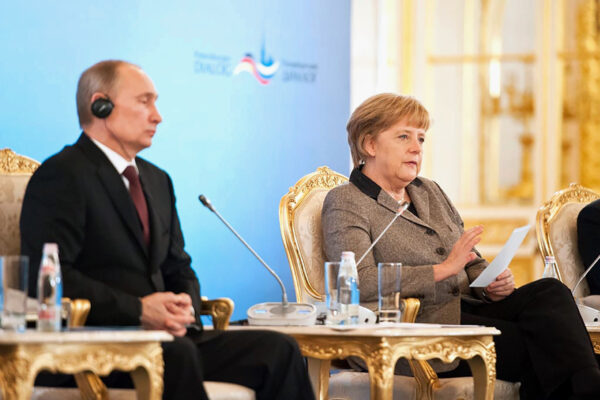
Germany’s Social Democrats are falling back on an old idea to try and improve relations with Russia. The second party in Angela Merkel’s coalition government is calling for rapprochement and understanding, assuming that modern-day Ostpolitik will have the same effect it did in the 1970s.
Frank-Walter Steinmeier, the German foreign minister and a prominent Social Democrat, told parliament last week — on the 75th anniversary of Nazi Germany’s invasion of the Soviet Union no less — that there can only be “lasting peace” in Europe through collaboration with Russia.
He had raised eyebrows earlier, when he condemned NATO military exercises in the Baltic states and Poland as “saber rattling and war cries.”
Steinmeier’s party leader, Sigmar Gabriel, who is also the economy minister, plans a trip to Moscow to meet with President Vladimir Putin.
Hard line
Merkel’s traditionally more Atlanticist Christian Democrats regard all this with apprehension. The chancellor’s office has made clear she is personally in charge of Russia policy.
Merkel has taken a harder line since Russia annexed the Crimean Peninsula from Ukraine in 2014.
Every six months, when European sanctions against Russia are up for renewal, we read that German business interests are lobbying for a relaxation of the embargo. Yet every six months they are extended without controversy.
Merkel has taken the measure of Putin and clearly doesn’t see change-through-rapprochement on the horizon.
The Social Democrats are more optimistic. This has little to do with German exporters exerting a nefarious influence over the workers’ party. Their mindset is informed by a history of East-West relations.
Different context
Ostpolitik did work once. Under Willy Brandt, the Social Democrat-led government of West Germany opened up relations with the East. Through small steps, like cultural and educational exchanges, it effected meaningful change. It thawed relations and undermined the Soviet Union’s ideological hold over Eastern Europe.
That was a different time. Ostpolitik worked because East Germany and the Soviet Union sought the West’s recognition of the status quo in Eastern Europe.
East Germany in particular wanted to be taken seriously as a country. Before Brandt, the government in Bonn hadn’t even recognized East Germany as a country. That changed in 1972.
Putin’s Russia seeks the opposite of the Soviet Union 45 years ago: a revision of the post-Cold War order in Europe.
The dissolution of the Soviet empire left Europe whole and free. Now Russia is deliberately weakening the pillars on which that Europe is built: the internal cohesion of the European Union, solidarity within NATO, the principles of liberal democracy and the inviolability of national borders. Any compromise — recognition of the Crimean Anschluss, a formal pledge not to build NATO military bases in Eastern Europe — would give Russia a victory and might encourage it to push harder.
